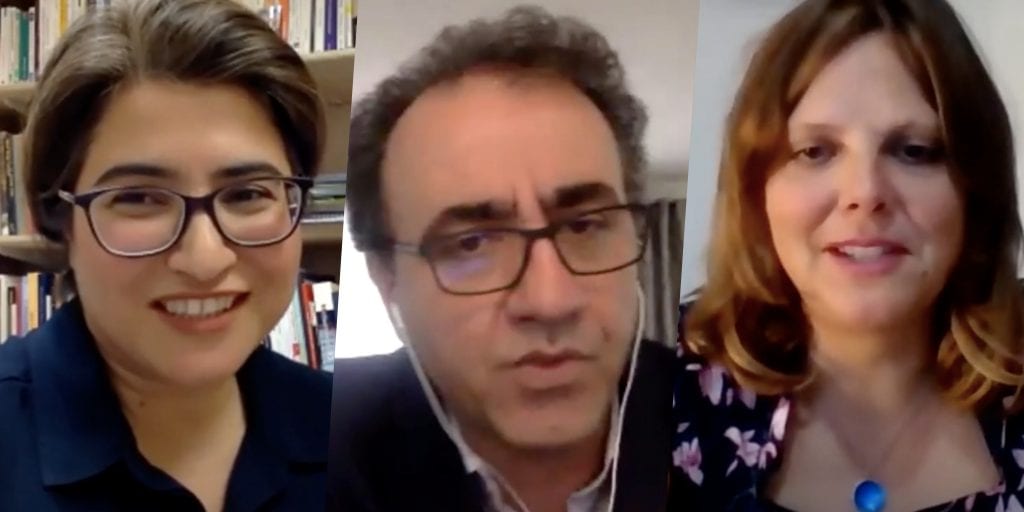Kurdish Culture, Literature, and Politics Come to UCF

From left to right, Dr. Farangis Ghaderi, Dr. Kamal Soleimani, Dr. Wendelmoet Hamelink
On October 2, the Kurdish Political Studies Program (KPSP) at SPSIA in partnership with the Department of Modern Languages and Literature, hosted the first of a series of virtual events in fall 2020. At the “Kurdish Literature & Culture” panel moderated by Dr. Haidar Khezri of UCF, KPSP welcomed Dr. Wendelmoet Hamelink from the Centre for Gender Research of Oslo University and Dr. Farangis Ghaderi from the University of Exeter. Dr. Hamelink gave a talk titled “Music, Migration, and Conflict: Kurdish Women’s Memories in Narrative and Song.” She discussed how in times of conflict and migration, the Kurdish songs were a mean of hope and resilience for several families living in border zones. Dr. Hamelink walked us through her extensive fieldwork experience when she met Kurdish families who experience transborder migration in their lifetime. She pointed out how their life stories were “marked by sad memories of escape and conflict” but their songs were “marked by positive emotions.” She concluded the talk by stressing how songs were juxtaposed to storylines but used as a way to remember life in the villages of origin and thanks to their repetitiveness, they became a means of cultural memory for several generations.
Dr. Farangis Ghaderi gave a talk about “Poetics of Change: The Emergence and Development of Modern Kurdish Poetry.” She walked us through the context in which modern Kurdish poetry emerged by starting her talk with an anecdote about the Kurdish poet Asiri (1890/95_1962) who traveled to Istanbul at the beginning of the 20th Century. The modern architecture and technologies impressed him to the point that when he got back home in Kirkuk, he burned his entire classical poetry collection that he considered “irrelevant” after what he saw in Istanbul. The need of moving with the times is what made modern Kurdish poetry emerge, motivated by social and political aims including the construction of Kurdish nationhood. In the absence of prose, poetry became a primary vehicle through which Kurdish intelligentsia made sense of modern developments. Dr. Ghaderi then provided rich examples to demonstrate how the Kurdish poetry after the 1930s has been characterized by a radical break from the classical times which unfolded over generations.
On October 16, the second virtual event “Political Economy of Kolberi (Cross-border Labor) in Eastern/Iranian Kurdistan” welcomed Dr. Kamal Soleimani, Assistant Professor at El Colegio de Mexico. In a talk moderated by Dr. Güneş Murat Tezcür, UCF’s Jalal Talabani Chair. Dr. Soleimani discussed the precarious conditions in which Kurdish kolbers (workers) deliver goods across the Iraqi and Iranian borders. Kolbers pursue a life on the edge characterized by deadly risks including shooting by Iranian border guards, stepping on mines, and exposure to elements. Many of them are killed and injured as a result. Dr. Soleimani argued that the plight of kolbers is an outcome of the policies of discrimination and inequalities pursued by the Iranian regime. He brought the testimonies of Kolbers interviewed during a period of fieldwork that described how marginalization and poverty motivate them in engaging in the cross-border labor and pointed out to the “normalization” of the phenomenon, including the lethal violence perpetrated against Kolbers.
The video streaming of the events is available on the Kurdish Political Studies Program YouTube channel. To stay updated about the events, follow KPSP on Facebook (@KPSPatUCF), or visit the website.
Written by Sara Belligoni, Ph.D. Candidate in Security Studies at the School of Politics Security and International Affairs and Graduate Research Assistant at the Kurdish Political Studies Program
